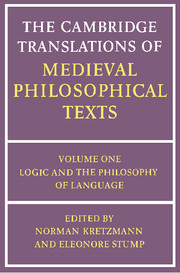Book contents
- Frontmatter
- Contents
- Preface
- General Introduction
- 1 BOETHIUS: On Division
- 2 Anonymous: Abbreviatio Montana
- 3 PETER OF SPAIN Predicables Categories
- 4 LAMBERT OF AUXERRE: Properties of Terms
- 5 Anonymous: Syncategoremata Monacensia
- 6 NICHOLAS OF PARIS: Syncategoremata (selections)
- 7 PETER OF SPAIN: Syllogisms; Topics; Fallacies (selections)
- 8 ROBERT KILWARDBY: The Nature of Logic; Dialectic and Demonstration
- 9 WALTER BURLEY: Consequences
- 10 WILLIAM OCKHAM: Modal Consequences
- 11 ALBERT OF SAXONY: Insolubles
- 12 WALTER BURLEY: Obligations (selections)
- 13 WILLIAM HEYTESBURY: The Compounded and Divided Senses
- 14 WILLIAM HEYTESBURY: The Verbs ‘Know’ and ‘Doubt’
- 15 BOETHIUS OF DACIA: The Sophisma ‘Every Man is of Necessity an Animal’
- Index
5 - Anonymous: Syncategoremata Monacensia
Published online by Cambridge University Press: 05 June 2012
- Frontmatter
- Contents
- Preface
- General Introduction
- 1 BOETHIUS: On Division
- 2 Anonymous: Abbreviatio Montana
- 3 PETER OF SPAIN Predicables Categories
- 4 LAMBERT OF AUXERRE: Properties of Terms
- 5 Anonymous: Syncategoremata Monacensia
- 6 NICHOLAS OF PARIS: Syncategoremata (selections)
- 7 PETER OF SPAIN: Syllogisms; Topics; Fallacies (selections)
- 8 ROBERT KILWARDBY: The Nature of Logic; Dialectic and Demonstration
- 9 WALTER BURLEY: Consequences
- 10 WILLIAM OCKHAM: Modal Consequences
- 11 ALBERT OF SAXONY: Insolubles
- 12 WALTER BURLEY: Obligations (selections)
- 13 WILLIAM HEYTESBURY: The Compounded and Divided Senses
- 14 WILLIAM HEYTESBURY: The Verbs ‘Know’ and ‘Doubt’
- 15 BOETHIUS OF DACIA: The Sophisma ‘Every Man is of Necessity an Animal’
- Index
Summary
Introduction
Syncategoremata Monacensia is an introductory treatise on syncategorematic words. It seems to have been written in England and probably dates from the last quarter of the twelfth century.
The basic, grammatical distinction between categorematic and syncategorematic words seems to have been that a word that can by itself serve as the subject or predicate of a sentence is categorematic and others are syncategorematic. Although there are some notable exceptions, in general these categorematic words are substantival and adjectival names, pronouns, and verbs (except auxiliary verbs), and syncategorematic words are all the others – e.g., conjunctions, adverbs, and prepositions.
Only some of those grammatically syncategorematic words were of interest to logicians – those whose inclusion in a proposition alters the inferential force of the proposition. But the logicians' list of syncategorematic words also included some grammatically categorematic words that have that sort of effect.
The treatise translated here discusses the logician's syncategorematic words ‘alone’ and ‘only,’ ‘except,’ ‘unless,’ ‘begins’ and ‘ceases,’ ‘necessarily’ and ‘contingently,’ ‘same,’ ‘both,’ ‘whole,’ and ‘whether.’ In this early textbook there is not much philosophical discussion of the nature of these syncategorematic words or of the reasons for the ways in which they function. Instead there is a brief presentation of rules the author associates with each of the syncategorematic words.
For further reading on syncategorematic words, see CHLMP IV.11, ‘Syncategoremata, Exponibilia, Sophismata.’
Syncategoremata Monacensia
[o. Preface]
{95} People who are unaware of the power of names are often victims of fallacious reasoning, as Aristotle observes in the first book of the Sophistici Elenchi (165315–16).
- Type
- Chapter
- Information
- The Cambridge Translations of Medieval Philosophical Texts , pp. 163 - 173Publisher: Cambridge University PressPrint publication year: 1989



